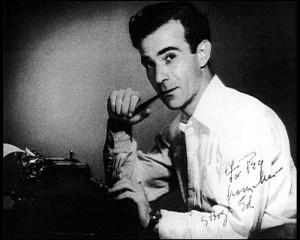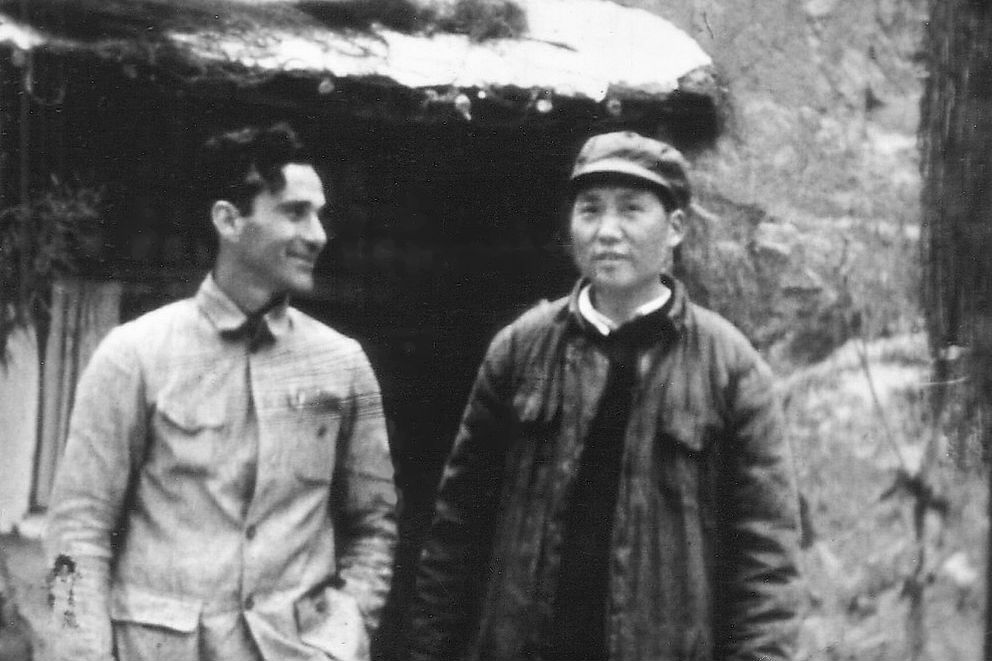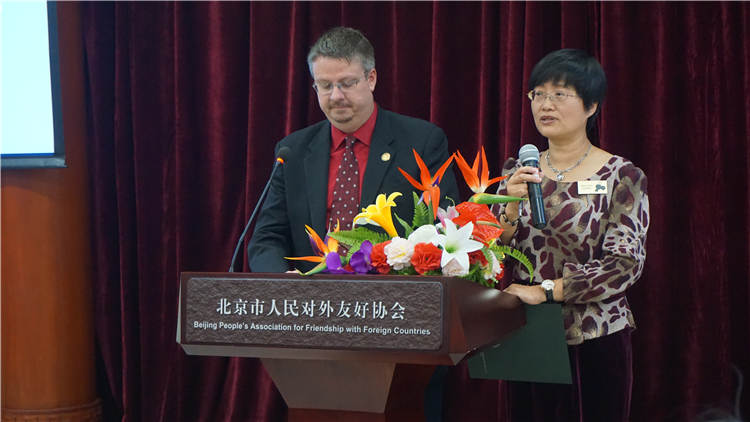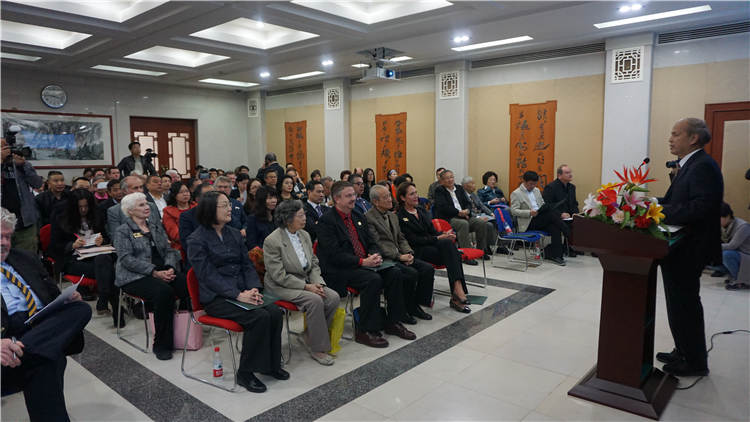


Edgar Parks Snow (1905 –1972), file photo.
As someone who works in media, I have always been aware of American journalist and author Edgar Parks Snow (1905 –1972).
He is the first Westerner to meet Mao Zedong and other Chinese Communist leaders in 1936. Out of that experience, he produced arguably the most important Western reporting on the birth of the Communist movement in China. He is also the first reporter to voice China's intention to break ice with the United States in the 1970s.
I am familiar with his historical significance, to journalism and modern Chinese history. But when I attended a memorial for him in Beijing yesterday, I was still surprised. Around 20 high-level officials, scholars and entrepreneurial students from Kansas City, where Edgar Snow was born, participated in the memorial. Academicians from the Center for Edgar Snow Studies of Peking University, as well as international exchange officials and senior diplomats, were also there, for the Chinese portion.
I asked myself: Why has Snow's influence been so far-reaching, aggregating people from all walks of life, from China and abroad? Why are we still discussing him 44 years after he left this world?
To answer that question, we have to go back to the very beginning – the year 1928, when Edgar Snow started his 13 years of living and reporting in China.
Snow briefly studied journalism at the University of Missouri, before landing his first job as a newspaper reporter for the Kansas City Star in 1927. In 1928, his wanderings took him to China, which became his base for the next 13 years while he reported on China for major American newspapers and magazines.
In June 1936, Snow slipped through the Kuomintang's blockade, reaching the base of the Chinese communists in Bao'an, Shaanxi province, in northern China. At that time, there were no reliable reports reaching the West of what was going on in Communist-controlled areas. The Kuomingtang tightly controlled the media, which described the communists as bandits and outlaws. No foreign reporters had visited Communist-controlled areas, or done interviews with Communist leadership.
However, Snow wanted to know what kind of army could have resisted the ruling party, that is undeniably superior in military strength, for more than a decade. He spent several months in the Bao'an base, where he enjoyed the greatest freedom that any reporter at any time ever would. Mao talked with him days and nights, and top leaders including Zhou Enlai and Peng Dehuai, as well as soldiers, scholars, farmers and pastors all spoke openly to him.
Snow came away with dozens of diaries and interviews, based on which he later produced his book-length report on the Chinese communists, “Red Star Over China,” which even now is a valued primary source on the early history of the Communist movement in China.
In his book, Snow explained Mao’s philosophy in politics, economics, military matters and diplomacy. For the first time, the enigmatic life of the Communist leader was presented to the world.

Edgar Snow and Mao Zedong in Bao'an town, Yan'an, in 1936.
The book put a human face on the men and women who were responsible for the Communist revolution. Snow depicted the way civilians, officers and soldiers utilized wasteland, plowed farmland, wove clothes and obtained ample food and clothing. He was amazed by the enthusiasm the Red Army displayed for the revolution, and by the support of ordinary citizens for these revolutionaries.
The book also tells the history of the famous Long March (1934-1936), when the Red Army traversed more than 12,500 kilometers over the course of 380 days in a military retreat. The route passed through some of the most difficult terrain in all of China. Snow hailed the bravery and endurance of the Red Army, calling the Long March “a spirited march of victory.”
“However one may feel about the Reds and what they represent politically (and here there is plenty of room for argument!),” Snow began, “it is impossible to deny recognition of their Long March … as one of the great exploits of military history.”
This is a typical way that Snow would begin an argument. He acknowledged the political differences between China and the West, but kept his observations open-minded and rational.
“It was his immersive reporting and his ability to set aside ideological differences that allowed him to create the works that later had such a huge impact,” said Sun Hua, deputy director and secretary general of the China Center for Edgar Snow Studies at Peking University.
This is true. Snow’s work strongly impacted the way Americans viewed Chinese communists. President Franklin D. Roosevelt read “Star over China” and met with Snow three times between 1942 and 1945 to learn about the CPC and China's war against Japanese aggression.
Sun deeply believes in the third-person effect in news reporting. He feels that a story about China presented by a Western reporter often gives a more reliable and appealing impression to Western readers.
“One Western reporter is more influential than 10 Chinese reporters. They know better how to tell the story. Just like Hollywood made the most successful movies about China – like ‘Mulan’ and ‘Kungfu Panda,’” he explained.
In 2011, a key Communist journal, Literature of the Chinese Communist Party, called “Red Star over China” a “role model for the Party’s publicity in the outside world.” Chinese media put out a call for “100 new Edgar Snows” to ensure that China’s real voice was heard.
“Snow saw China’s evolution in a comprehensive and tolerant way. That’s because of his sophisticated understanding of Chinese culture. And that’s why his writings were prophetic. China needs more such reporters to showcase its peaceful development,” Sun said.
“Among the 100 key projects listed in 13th Five-Year Plan, the last one is to ‘cultivate a team that tells China stories well.’ The team obviously should include more foreign friends who understand China,” he added.
I agree with him. China has already attained the status of a world power. But its image in the Western world remains shaky. It is a standard characteristic of the U.S. media landscape that developing and Communist countries tend to appear in a somewhat negative and sensationalized light. And China is a victim of that. If these problems grow, China will no longer be able to move forward.
Even 75 years after Snow left China to report in Russia during World War II, he still serves as a mediator and bridge between China and the U.S. For the past 25 years, Snow’s birthplace, Kansas City, has been a sister city to Yan’an, a key city in the early history of Communism in China. It also more recently became a sister city of Xi’an, capital of Shaanxi province.
Scott Wagner, Mayor Pro Tem of Kansas City, said he has seen highly promising opportunities when it comes to working with China.
“Kansas City excels in engineering, agriculture, education and health. These are the areas most likely to create business links with China. ”
Wagner said that he, together with a senior official and other representatives from Kansas City, are about to visit Tianjin as well as several of the most industrial and creative cities in southern China for the purpose of exploring potential cooperation.
Since the 1980s, the China Society for People’s Friendship Studies has been holding a biannual Edgar Snow Symposium with the Edgar Snow Memorial Foundation of Missouri University, where Snow received his journalism education. China and the U.S. take turns hosting the event.
“We know the people, we build the networks; it’s possible and easier to spread out,” said Nancy Hill, president of the Edgar Snow Memorial Foundation.
Zhen Jianguo, vice president of the China Society for People’s Friendship Studies, told me that Snow is a “banner” in vast international exchange. Many cross-cultural events have been held in his honor, including memorials, seminars and more.
It occurred to me that, no matter the era, people around the world always need some sort of a link. In Snow’s time, he linked Red China to the outside world, and his experience in China helped him to gain status as one of the most notable reporters in history. Today, China still needs an outlet to win understanding, and the world needs China, the largest consumer market in the world, to prosper.
This is one more reason why China needs more people like Edgar Snow – international figures that address the common bonds between China and the West, and passionately build links to achieve that goal, just like Snow did.

On Oct. 1, 1970, the 21st anniversary of the founding of the People's Republic of China, Mao Zedong invited Edgar Snow to watch the military parade and celebrations from the top of the rostrum at Tiananmen Square.

Scott Wagner, left, Mayor Pro Tem of Kansas, Edgar Snow's hometown, addresses the 17th Edgar Snow Symposium in Beijing on Oct. 11, 2016. [Photo/people.cn]

The 17th Edgar Snow Symposium was held in Beijing on Oct. 11. Representatives from the Edgar Snow Memorial Foundation of Missouri University, the China Society for People’s Friendship Studies and the Center for Edgar Snow Studies of Peking University attended the event. [Photo/people.cn]

Zhen Jianguo, vice president of the China Society for People’s Friendship Studies, addresses the 17th Edgar Snow Symposium in Beijing on Oct. 11, 2016. [Photo/people.cn]

This photo shows the Edgar Snow Reading Room at the Miller Nichols Library, the University of Missouri-Kansas City. [Photo/people.cn]

 Who Will Fit The Chinese Roles In Game Of Thrones?
Who Will Fit The Chinese Roles In Game Of Thrones? China's Hubei Shennongjia added to World Heritage List
China's Hubei Shennongjia added to World Heritage List Cute Dog At Fruit Stand Becomes Latest Internet Sensation
Cute Dog At Fruit Stand Becomes Latest Internet Sensation Top 10 livable Chinese cities
Top 10 livable Chinese cities The last primitive tribe in China
The last primitive tribe in China China's first intelligent security robot debuts in Chongqing
China's first intelligent security robot debuts in Chongqing A Total of 3,552 Subscribers Vanish In Two Days; YouTube Closes All Doors to Users’ Inquiries
A Total of 3,552 Subscribers Vanish In Two Days; YouTube Closes All Doors to Users’ Inquiries Out of this world! Futuristic UFO-shaped yacht has its own garden and a stunning underwater viewing deck
Out of this world! Futuristic UFO-shaped yacht has its own garden and a stunning underwater viewing deck An old tea house in Chengdu
An old tea house in Chengdu Furious Customer Crushes All the Buns from Vendor Just Because He Was Given the Wrong Flavor
Furious Customer Crushes All the Buns from Vendor Just Because He Was Given the Wrong Flavor